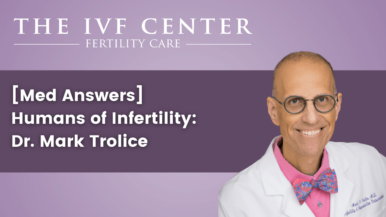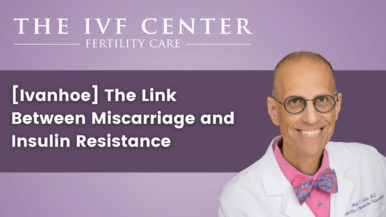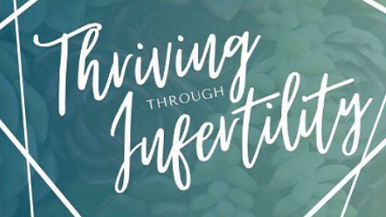 Infertility affects 12% of women during their reproductive years, approximately 1 in 8. In the U.S., over seven million people struggle with this challenge. The accepted diagnosis of infertility is an inability to deliver a child after one year of unprotected intercourse provided the woman has regular menstrual cycles and the couple has no risk factors. While these numbers usually reflect primary infertility, there is no accurate statistic on the number of women and couples facing secondary infertility, i.e. a diagnosis of infertility following at least one prior live birth. Furthermore, the emotional consequences of secondary infertility can be distinct from primary as the following points outline.
Infertility affects 12% of women during their reproductive years, approximately 1 in 8. In the U.S., over seven million people struggle with this challenge. The accepted diagnosis of infertility is an inability to deliver a child after one year of unprotected intercourse provided the woman has regular menstrual cycles and the couple has no risk factors. While these numbers usually reflect primary infertility, there is no accurate statistic on the number of women and couples facing secondary infertility, i.e. a diagnosis of infertility following at least one prior live birth. Furthermore, the emotional consequences of secondary infertility can be distinct from primary as the following points outline.
1. No one validates you
Having already experienced a baby, many women facing secondary infertility are often advised and frustrated by family and friends who suggest feeling blessed and content with a first child. They are often counseled to be grateful for the miracle since other women are struggling to have their first child. Unfortunately, these comments to the woman with secondary infertility are emotionally damaging by potentially inducing guilt for her desiring another child. Every attempt at conception is unique with its own personal decisions. One should avoid judging or presuming they can relieve a woman challenged with infertility.
As a result, the woman’s support system needs to recognize infertility is devastating whether it is for the first child or subsequent. Bottom line – Anytime a woman is having trouble conceiving, sensitive and appropriate support is crucial to validate her challenge.
2. This time it’s for your child
When a woman or couple decides to have a first child, they are often seeking personal fulfillment, creation of a family, enhancement of a loving bond, along with the joy of bringing life into the world and rearing the child. Primary infertility disrupts this life’s plan and creates powerful feelings that include inadequacy, vulnerability, overwhelm, as well as potential disruption of relationships. Once there is an existing child, the decision to grow the family, in addition to the above reasons, often stems from the profound desire to provide the child a sibling. Consequently, while the psychological focus of primary infertility is on the woman or couple, secondary is often about the needs of the living child. Parents often describe loving their child more than themselves. So, secondary infertility is devastating since it deprives and disappoints their existing child. Bottom line – While a parent(s) having one child is a blessing, the desire for a second child as a sibling can be equally if not more compelling than for the initial child.
3. Usually explainable
While 20% of primary infertility is considered unexplainable, the percentage of unexplained secondary cases is much lower, though no actual statistic is agreed upon. Secondary infertility usually results from a change; i.e. something has occurred since the prior conception to result in infertility. Some examples of this “change” include female weight gain, advancing age, tubal ligation, pelvic surgery with resultant scarring, partner vasectomy and more rare, uterine scarring following D&C for miscarriage, and isthmocele (a chronic fluid collection inside the uterus following C/Section). The good news is when a cause is discovered, treatment can be directed at the problem area for an improved chance of a pregnancy.
4. Your doctor delays referring since you have one child and presumes you will readily conceive again
“Don’t worry, it will happen just like last time.” These words by a physician are echoed in many Ob/Gyn offices throughout the country to a woman having secondary infertility. However, when a woman feels there is a problem, the physician needs to address the patient concerns to alleviate her stress, dispel myths, and direct her appropriately toward her goal for a pregnancy. Studies have shown, pregnancy is achieved in a shorter time period when the Ob/Gyn promptly refers to a fertility specialist.* Delaying the referral, the Ob/Gyn increases patient frustration and can delay her time to pregnancy. Bottom line– See a fertility specialist* if you have been trying to conceive for one year under age 35 and six months over age 35 or sooner in a woman without regular periods and/or if there are risk factors of concern for the couple.
5. If you experienced primary infertility, whatever the reason, now age is an additional factor
There is no escaping the biologic clock. Women are born with their entire endowment of eggs: 1-2 million at birth; 200-400,000 remain at puberty; hundreds are utilized monthly but only one ovulates while all the others are resorbed. It is estimated a woman only uses 300-500 eggs in her reproductive lifetime. The greatest indicator of fertility is a woman’s age and peak fertility occurs at less than 30 years of age. Subsequently and gradually, fertility declines, miscarriages increase mostly due to chromosomal abnormalities of the aging egg. Given prior fertility, a patient may delay moving on to aggressive therapy. Fortunately, pregnancy rates are higher than ever before using IVF, particularly with the addition of PGS (Preimplantation Genetic Screening to evaluate each of the embryo’s chromosomes in order to significantly increase the pregnancy rate and reduce miscarriages. Bottom line – Be aggressive with your fertility if you are above age 35 and consider IVF with embryo chromosome testing.
6. Easy pregnancy coming off birth control pills the first time
One of the many known benefits of BCP (Birth Control Pills), menstrual cycle regulation can be effective in treating the most common hormonal disorder of women called PCOS (Polycystic Ovarian Syndrome). Women with PCOS struggle from ovulation dysfunction and unwanted hair growth along with the medical risks of weight gain, prediabetes, elevated blood pressure/cholesterol, and risk of pre-uterine cancer. PCOS affects 5-10% of all women in their reproductive years. This hormonal imbalance often requires ovulation induction usually in the form of tablets such as clomiphene citrate or more recently letrozole. A minor outpatient surgery called ovarian diathermy is also very effective at restoring ovulation spontaneously. Fortunately, years of BCP usage in a woman with PCOS has been shown to restore ovulation function, at least for the first three to six months following discontinuation. When a woman with PCOS desires their second child, they are often either not taking BCP for enough time or at all, hence their secondary infertility results from a lack of ovulation. Bottom line – See a fertility specialist promptly if your cycles are irregular.
7. Tubal ligation or vasectomy – a complicated decision
An obvious obstruction in the ability to conceive, tubal ligation and vasectomy are surgical procedures that induce secondary infertility and allow only two options for fertility – reversal or IVF. Contrary to prior thought, vasectomy reversal success is not based on the years from the original procedure. Success rates for both tubal and vasectomy reversal procedures are driven by the woman’s age. As a result, women above age 35 should give strong consideration to IVF. In a couple with an unreversed vasectomy, IVF also requires a minor procedure to retrieve sperm called MESA or TESA (Microsurgical Epididymal or TEsticular Sperm Aspiration). Sperm retrieved in this manner cannot be artificially inseminated into a woman’s uterus but requires IVF with the advanced fertilization technique of ICSI (IntraCytoplasmic Sperm Injection) because the sperm are not mature to fertilize naturally. Success rates are similar using ICSI as opposed to conventional fertilization with IVF. Bottom line – Tubal ligation/vasectomy options should be driven by the female partner’s age as well as the cost of the procedures.
*A fertility specialist is a physician who has undergone additional years of training following residency in a fellowship and is board-certified in the specialty of Reproductive Endocrinology & Infertility. More information can be learned at http://www.socrei.org
We are Central Florida’s most successful IVF Program.
To learn more about our work, please schedule your consultation or join the conversation on Facebook and Twitter.






